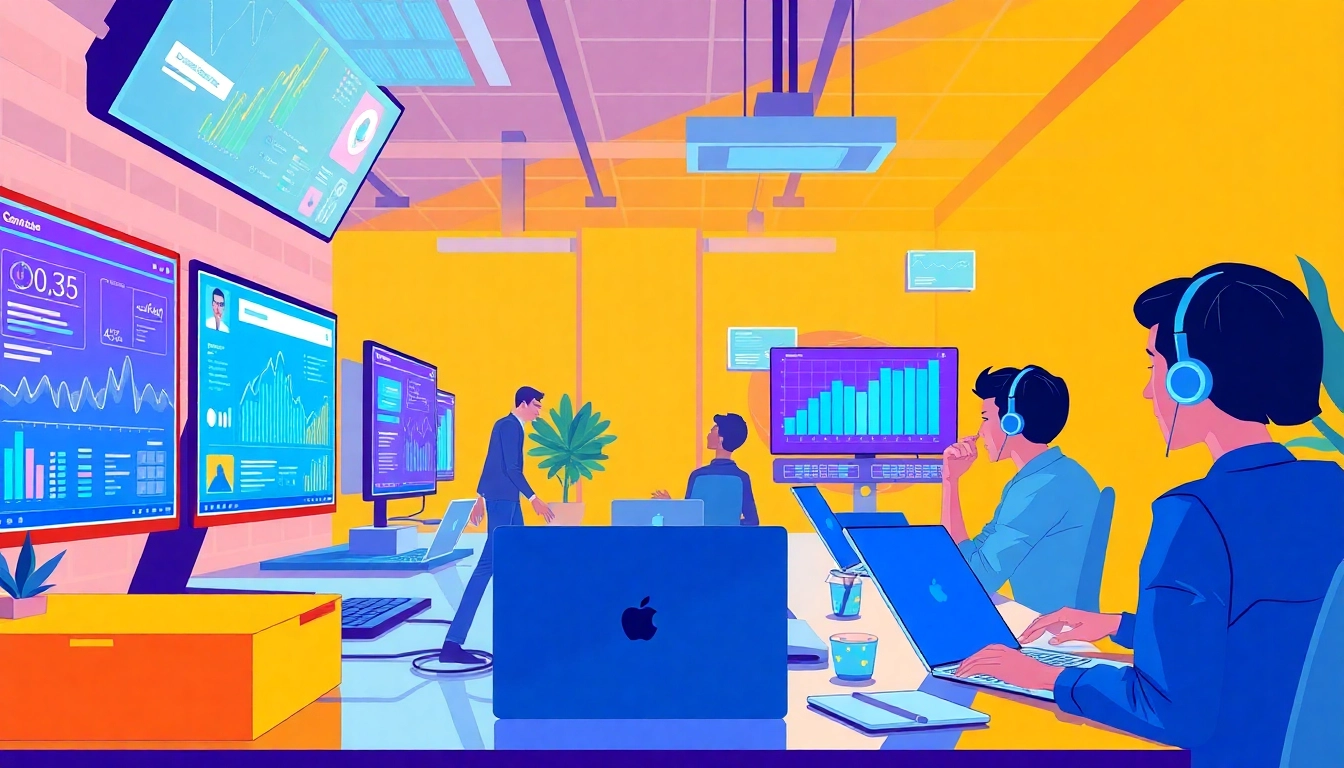Understanding AI Marketing Agents
What Are AI Marketing Agents?
AI marketing agents are sophisticated software solutions designed to enhance marketing processes through artificial intelligence. These autonomous tools leverage machine learning algorithms to perform a wide range of marketing tasks such as analyzing consumer behavior, segmenting audiences, personalizing content, and automating campaigns. Essentially, they act as “agents” that interact with users, platforms, and data to optimize and simplify marketing strategies.
The role of AI marketing agents is particularly significant as businesses strive to maintain relevance and competitive edge in an increasingly digital market. They facilitate a data-driven approach, greatly reducing the manual effort involved in marketing execution. These agents not only perform recurring tasks but also offer insights by recognizing patterns and forecast trends that human marketers might overlook.
For instance, AI marketing agents can manage email campaigns, analyze customer feedback, and dynamically adjust marketing strategies based on real-time data. The underlying technology enables agents to process vast amounts of information in seconds, making them indispensable for modern marketing efforts.
The Evolution of Marketing Automation
The journey of marketing automation began in the early 2000s with basic email marketing tools. Over time, the landscape evolved significantly, incorporating customer relationship management (CRM) systems, social media tools, and analytics. However, the introduction of AI brought profound changes, allowing automation systems to become smarter and more responsive.
AI marketing agents are at the forefront of this evolution. They incorporate data from various sources such as social media insights, website interactions, and purchasing histories to create more refined consumer profiles. By merging big data analytics with machine learning, these agents enable marketers to personalize campaigns like never before, targeting individuals with tailor-made messages that resonate.
Moreover, the shift toward omnichannel marketing has solidified the importance of AI marketing agents. As customers engage across numerous platforms, these agents help unify messaging and branding, ensuring a consistent customer experience regardless of where interactions occur.
Key Features of AI Marketing Agents
AI marketing agents come equipped with a suite of powerful features designed to streamline marketing processes:
1. Data Analysis and Insights: They can analyze vast datasets to extract actionable insights about consumer behavior, market trends, and campaign performance.
2. Audience Segmentation: AI agents can segment audiences based on predetermined parameters such as demographics, purchase history, and engagement levels—allowing for targeted marketing strategies.
3. Predictive Analytics: By employing machine learning models, these agents can predict customer behaviors and preferences, helping businesses anticipate needs and tailor offerings accordingly.
4. Content Automation: AI can generate personalized content at scale, including emails, social media posts, and even blog entries, based on user interests and behavior.
5. Campaign Management: They assist in automating campaign schedules, optimizing budgets, and adjusting strategies in real time based on performance data.
6. Performance Tracking: Continuous monitoring and analytics allow businesses to assess and refine marketing strategies, ensuring optimal resource allocation and higher ROI.
The synthesis of these features not only enhances operational efficiency but also drives engagement and conversion rates, making AI marketing agents a vital tool for marketers today.
Benefits of Using AI Marketing Agents
Improving Personalization in Marketing
One of the standout benefits of AI marketing agents is their ability to personalize marketing campaigns effectively. Traditional marketing largely relied on broad demographic segments, which often missed the mark. AI agents, however, delve deep into customer data, enabling hyper-personalization.
For instance, they analyze consumer interactions across various touchpoints—website visits, social media engagements, email responses—to create tailored messages that resonate. By understanding individual preferences, marketers can craft offers that directly align with consumer needs, thus improving engagement and conversion.
Research shows that personalized marketing can significantly increase response rates. In fact, consumers are more likely to purchase from brands that offer personalized experiences, demonstrating the tangible benefits of AI-driven personalization.
Enhancing Efficiency and Productivity
In marketing, time is often of the essence. AI marketing agents excel in automating repetitive tasks and workflows, freeing up marketers to concentrate on strategy and creative thinking. They can execute campaigns without manual intervention, updating various platforms simultaneously and ensuring that marketing teams do not get bogged down with administrative duties.
Additionally, AI agents can analyze campaign performance in real-time, offering insights that help marketers pivot strategies on the fly. For example, if a particular ad isn’t performing well, the AI can suggest adjustments or reallocate budgets to better-performing strategies, enhancing overall productivity.
This ability to optimize efficiency translates to increased productivity—allowing businesses to achieve more with less time and fewer resources.
Case Studies of Successful Implementations
Several companies have successfully integrated AI marketing agents into their operations to achieve remarkable results:
1. Coca-Cola: By utilizing AI in their marketing strategy, Coca-Cola was able to analyze millions of social media posts and customer interactions to craft personalized marketing campaigns. This data-driven approach led to a higher engagement rate and increased brand loyalty.
2. Amazon: One of the pioneers of AI-driven marketing, Amazon leverages AI algorithms to provide personalized recommendations to customers based on their past behaviors. This level of personalization not only improves customer satisfaction but also maximizes sales through targeted marketing efforts.
3. H&M: The fashion retailer has implemented AI marketing agents to analyze inventory and customer preferences, allowing for personalized marketing campaigns that resonate with their audience. The result was a noticeable uptick in customer engagement and conversion rates.
These examples illustrate not only the potential of AI marketing agents but also how innovative companies are leveraging them to enhance customer engagement and drive sales.
Choosing the Right AI Marketing Agent
Top Characteristics to Look For
When selecting an AI marketing agent, businesses should consider several critical characteristics:
1. Ease of Use: The platform should be user-friendly and require minimal training for team members. A steep learning curve can hinder adoption and create bottlenecks.
2. Integration Capabilities: The selected AI agent should easily integrate with existing marketing tools and systems to provide a seamless workflow and data exchange.
3. Scalability: As a business grows, its needs will change. Choose an AI platform that can scale with the business and adapt to evolving marketing strategies.
4. Customer Support: Reliable customer support and resources are critical for troubleshooting and optimizing the use of the AI marketing agent.
5. Data Privacy Compliance: Ensure that the agent adheres to stringent data protection regulations, safeguarding customer information.
6. Performance Metrics: The agent should offer robust analytics to measure campaign performance and return on investment (ROI).
Evaluating these characteristics will help businesses select an AI marketing agent that aligns with their operational goals and marketing strategies.
Leading AI Marketing Agent Platforms
Numerous platforms offer AI marketing agents, each with unique capabilities and strengths. Some of the leading options include:
1. HubSpot: HubSpot’s marketing software integrates AI-powered tools for email marketing, content optimization, and lead nurturing, making it an excellent choice for inbound marketing.
2. Marketo: Known for its automation capabilities, Marketo employs AI to tailor content and manage lead scoring, helping marketers target the right audience effectively.
3. Salesforce Einstein: This AI layer enhances the Salesforce CRM, providing features like predictive lead scoring, intelligent recommendations, and natural language processing to optimize customer interactions.
4. Pardot: A B2B-focused marketing automation tool that utilizes AI to streamline lead management, scoring, and nurturing, ensuring that companies can identify and engage potential customers effectively.
5. Mailchimp: Initially an email marketing tool, Mailchimp now integrates AI features for audience segmentation, content recommendations, and performance analysis, empowering marketers to create personalized campaigns.
These platforms represent a cross-section of the diverse AI marketing landscape, catering to various business needs and sectors.
Considerations for Small vs. Large Businesses
The choice of AI marketing agents can vary significantly based on the size of the organization. Small businesses often require cost-effective solutions that provide significant automation capabilities without the complexity of larger systems. They may prioritize ease of use, affordability, and essential features that align with immediate marketing needs.
On the other hand, large enterprises may look for comprehensive solutions that offer advanced features, integration with existing technologies, and in-depth analytical capabilities. They need systems that can manage large datasets, provide multi-user access, and adapt to complex organizational structures.
Regardless of size, both small and large businesses benefit from prioritizing scalability, customer support, and performance metrics when selecting an AI marketing agent.
Best Practices for Implementing AI Marketing Agents
Step-by-Step Guide to Integration
Implementing an AI marketing agent requires a well-planned approach. Here’s a step-by-step guide to ensure smooth integration:
1. Define Objectives: Clearly outline what you want to achieve with the AI agent. Focus on specific goals such as improving customer engagement, increasing sales, or enhancing data analysis.
2. Assess Current Infrastructure: Evaluate your existing marketing tools to identify gaps that the AI agent will fill. Ensure that the selected agent can integrate seamlessly with your current systems.
3. Select the Right Agent: Based on the identified needs, select an AI marketing agent that aligns with your objectives and organizational structure.
4. Pilot Testing: Before a full rollout, conduct a pilot test in a controlled environment. Monitor performance closely, gathering insights to make necessary adjustments.
5. Training and Onboarding: Invest time in training your team to maximize the capabilities of the AI agent. An adequately trained staff will lead to better adoption and more effective usage.
6. Launch: Once testing and training are complete, implement the AI marketing agent organization-wide.
7. Monitor and Optimize: Continuously evaluate the agent’s performance against your objectives. Be prepared to make adjustments based on analytics and feedback.
This methodical approach will help businesses effectively integrate AI marketing agents into their marketing strategies.
Measuring Success and ROI with AI Agents
Measuring the success of AI marketing agents involves multiple metrics aimed at evaluating their impact on business objectives:
1. Engagement Metrics: Analyze email open rates, click-through rates, and social media engagement to assess how well personalized content resonates with the audience.
2. Conversion Rates: Monitor the conversion rates across campaigns to determine if the AI agent effectively addresses potential customers and drives them down the sales funnel.
3. Cost Per Acquisition (CPA): Evaluate the cost-effectiveness of marketing strategies implemented by the AI agent. A decreasing CPA indicates improved efficiency.
4. Return on Investment (ROI): Calculate the ROI by comparing the revenue generated from campaigns aided by the AI agent against the overall costs involved in operating the system.
5. Customer Feedback: Gather direct feedback from customers regarding their experiences with personalized communications and offerings to assess satisfaction levels.
By focusing on these metrics, businesses can gain valuable insights into the effectiveness of their AI marketing agents, ensuring they utilize resources effectively.
Overcoming Common Challenges
While implementing AI marketing agents offers numerous benefits, organizations may encounter challenges. Here are several common obstacles and their solutions:
1. Data Quality Issues: Poor-quality data can undermine the effectiveness of AI marketing agents. It is crucial to clean and standardize data before implementation to ensure accurate insights.
*Solution*: Establish clear data governance protocols to maintain data integrity and regularly audit data sets.
2. Resistance to Change: Employees may resist adopting AI solutions fearing job displacement or complexity.
*Solution*: Communicate the benefits of AI agents clearly and provide adequate training to alleviate concerns. Emphasizing that AI is a tool to enhance rather than replace human capabilities can also mitigate resistance.
3. Integration Challenges: Integrating new AI solutions with existing systems may pose difficulties.
*Solution*: Select platforms that offer strong integration capabilities and support during the initial setup phase. Invest time in testing integration thoroughly before going live.
4. Overreliance on Automation: Organizations may fall into the trap of overautomating, losing the personal touch in marketing.
*Solution*: Use AI agents to complement human input rather than replace it entirely. Maintain a balance between automated processes and human creativity to foster authentic customer relationships.
By proactively addressing these challenges, businesses can maximize the benefits of AI marketing agents while minimizing potential pitfalls.
The Future of AI Marketing Agents
Trends to Watch in AI Marketing
The landscape of AI marketing is constantly evolving, with several emerging trends poised to reshape how businesses engage consumers:
1. Voice Search Optimization: As voice-activated devices become more prevalent, AI marketing agents will adapt to optimize content for voice searches, ensuring brands remain discoverable.
2. Enhanced Personalization: Future AI agents will push the boundaries of personalization, utilizing deeper behavioral insights and predictive analytics to tailor customer experiences, ensuring relevance and engagement.
3. Visual Recognition Technologies: The use of AI for visual recognition will enhance content marketing strategies, enabling marketers to understand how consumers interact with visual content across platforms.
4. Greater Emphasis on Data Privacy: As concerns about data privacy grow, AI marketing agents will adapt to comply with regulations while still delivering personalized experiences.
5. Collaborative AI: Implementing AI marketing agents in collaborative communities will enable businesses to share insights and strategies, creating a collective intelligence framework that enhances overall effectiveness.
Staying ahead of these trends will be crucial for businesses looking to leverage AI marketing agents.
Impact on Marketing Strategies
AI marketing agents are not just tools; they fundamentally alter the way marketing strategies are formulated and executed. As organizations adapt, they will increasingly prioritize data-driven decision-making, just-in-time strategies, and omni-channel integration.
With AI capabilities, marketers can better understand their audience segments, enabling them to craft campaigns that truly resonate. This transition towards smarter, insight-led marketing will route the strategic focus away from mere promotional drives towards creating genuine connections with consumers.
The flexibility and adaptability of AI marketing agents mean organizations will rank high on agility, allowing for rapid shifts in messaging and approach in response to evolving market dynamics.
Predictions for the Next Decade
Looking into the future, the role of AI marketing agents will likely expand in scope and impact. Predictions include:
1. Increased Automation: As AI models grow more sophisticated, the potential for autonomous decision-making in marketing will rise, with AI marketing agents taking on increasingly complex tasks.
2. Ubiquitous Use of AI: Businesses of all sizes will seamlessly integrate AI marketing agents into daily operations—leading to a landscape where AI-driven marketing becomes the standard rather than an exception.
3. Cross-industry Applications: The principles behind AI marketing agents will extend beyond traditional marketing sectors, impacting fields like healthcare, finance, and non-profits as organizations seek improved outreach and engagement strategies.
4. Ethical Considerations: Debates around the ethics of AI in marketing—particularly regarding data privacy and consumer rights—will shape regulatory landscapes and industry standards, encouraging more responsible usage of AI technologies.
The impact of AI marketing agents promises a transformative shift in how brands connect with consumers, ushering in a new age of innovative, responsive marketing strategies.



